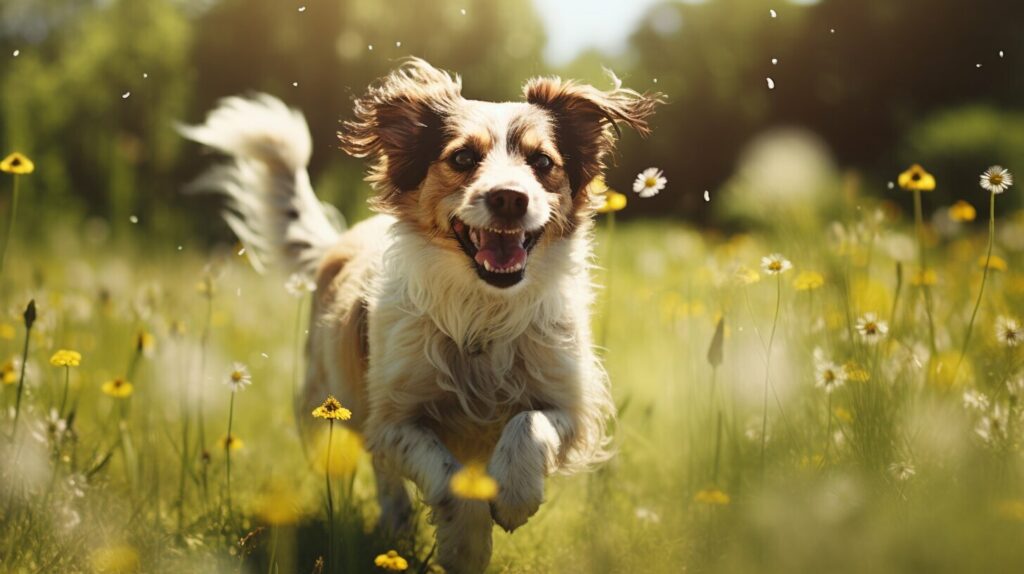If you’re a dog owner, you may have noticed your furry friend hiccuping from time to time. While it can be concerning to see your pet experiencing hiccups, rest assured that it’s a common occurrence in dogs and often harmless. In this article, we’ll explore the causes of dog hiccups and provide solutions for preventing and treating them.
Key Takeaways:
- Dogs hiccuping is a normal occurrence and typically harmless.
- There are various factors that can contribute to dog hiccups, such as eating too quickly, excitement, stress, or gastrointestinal issues.
What Causes Hiccups in Dogs?
Dog hiccups are a common and typically harmless occurrence, but understanding what causes them can help you prevent them from happening in the first place. There are several factors that can contribute to a dog experiencing hiccups, including:
- Eating too quickly: Dogs that eat too quickly or gulp down large amounts of food can swallow air, leading to hiccups.
- Excitement: If a dog gets overly excited, their breathing pattern can be disrupted and lead to hiccups.
- Stress: Just like in humans, stress can cause hiccups in dogs by affecting their breathing and digestive systems.
- Gastrointestinal issues: Certain gastrointestinal problems, such as acid reflux or bloating, can cause a dog to hiccup.
While the causes of dog hiccups are typically minor and temporary, persistent or frequent hiccups can be a sign of an underlying health issue and should be addressed by a veterinarian.
Recognizing Dog Hiccups
If you are a dog owner, you may have heard your furry friend hiccuping at some point. Dog hiccups are fairly common and usually harmless. While they may seem alarming at first, they are usually not a cause for concern.
One of the most recognizable signs of canine hiccups is the characteristic sound – a series of quick, sharp inhalations followed by a single exhalation. You may also notice your dog’s abdomen or chest moving rhythmically.
In most cases, dog hiccups will last for just a few minutes and then disappear on their own. However, if your dog’s hiccups last for an extended period of time and are accompanied by other symptoms such as vomiting, loss of appetite, or lethargy, it may be time to seek veterinary care.
Could Hiccups Be A Symptom of Something More Serious?
While dog hiccups are usually harmless, they can be a symptom of an underlying health condition such as respiratory issues, heart disease, or a gastrointestinal problem. If your dog experiences frequent or prolonged hiccups, it’s best to consult with your veterinarian to ensure there isn’t a more serious issue at play.
Is It Normal for Dogs to Hiccup?
If you notice your dog hiccupping occasionally, it is generally considered normal and nothing to worry about. Hiccups in dogs are typically harmless and will usually go away on their own without any treatment. However, if your dog experiences frequent or persistent hiccups, it may be a cause for concern. Fortunately, there are steps you can take to prevent your dog from getting hiccups in the first place.
Prevention
Preventing dog hiccups can be as simple as making a few lifestyle changes. Here are some tips to help prevent dog hiccups:
- Feed your dog smaller meals more frequently instead of one large meal
- Encourage your dog to eat slowly and calmly
- Avoid feeding your dog immediately before or after exercise
- Minimize stressors in your dog’s environment
By implementing these preventative measures, you can help reduce the likelihood of your dog experiencing hiccups.
How to Prevent Dog Hiccups
If your dog is prone to hiccups, there are several things you can do to prevent them from occurring:
- Feed smaller meals more frequently: Dogs that eat too quickly or too much at once are more likely to experience hiccups. To prevent this, offer smaller meals throughout the day rather than one or two large meals.
- Slow down eating: You can use puzzle feeders, slow-feed bowls, or simply place a ball or toy in your dog’s bowl to slow down their eating.
- Reduce stress: Dogs can experience stress from changes in their environment, loud noises, or separation anxiety. To minimize stress, provide your dog with a secure and stable home environment, and use behavior modification techniques if necessary.
- Limit excitement: Dogs that get overly excited (such as during playtime) can also experience hiccups. Try to keep play sessions calm and controlled.
By implementing these simple strategies into your dog’s routine, you can help reduce the frequency and intensity of hiccups. Remember, occasional hiccups are not usually a cause for concern, and can be easily managed with some simple lifestyle adjustments.
Natural Remedies for Dog Hiccups
While dog hiccups are typically harmless, they can be bothersome for both you and your furry friend. Fortunately, there are a number of natural remedies you can try to alleviate your dog’s hiccups.
Offer small sips of water
Providing your dog with small sips of water can help to soothe their throat and potentially stop the hiccups. However, be sure not to give them too much water at once, as this can actually exacerbate the hiccups.
Gently massage the chest
You can try gently massaging your dog’s chest to help relax any muscles that may be contributing to the hiccups. Use slow, circular motions and pay close attention to your dog’s responses to ensure that they are comfortable with the massage.
Offer a distraction
If your dog’s hiccups are caused by stress or excitement, offering a distraction such as a favorite toy or treat can help to refocus their attention and potentially stop the hiccups.
Use natural remedies
There are a number of natural remedies that have been known to help alleviate dog hiccups. For example, diluted apple cider vinegar or honey mixed with water may help to soothe the throat and reduce the frequency of hiccups. However, be sure to consult with your veterinarian before administering any natural remedies to ensure that they are safe and appropriate for your dog.
Remember, while natural remedies can be helpful in alleviating dog hiccups, they are not a substitute for proper veterinary care. If your dog’s hiccups persist or are accompanied by other concerning symptoms, be sure to consult with your veterinarian to determine the underlying cause and appropriate treatment plan.
Over-the-Counter Options for Dog Hiccups
If your dog’s hiccups are persistent or bothersome, there are over-the-counter options that can help alleviate them. However, it’s important to consult with a veterinarian before administering any medication.
| Medication | Usage |
|---|---|
| Anti-gas medications | Can help reduce gas in the stomach, which may contribute to hiccups. |
| Simethicone | A drug that breaks up gas bubbles and helps alleviate flatulence and bloating, which may also help with hiccups. |
It’s important to note that medication should not be the first line of defense for dog hiccups. In most cases, natural remedies and lifestyle changes can effectively address the issue. Additionally, if your dog’s hiccups persist or worsen, it may be a sign of an underlying health issue that requires veterinary attention. Always consult with a professional before administering any medication to your pet.
When to Seek Veterinary Care
While most cases of dog hiccups are harmless and resolve on their own, there are certain situations where it may be necessary to seek veterinary care. If your dog’s hiccups persist for an extended period (more than a few minutes to an hour) or are accompanied by other concerning symptoms such as vomiting, diarrhea, or difficulty breathing, it’s important to contact your veterinarian.
If your dog is experiencing frequent or persistent hiccups, your veterinarian may perform a physical examination and recommend further testing to rule out any underlying conditions that may be contributing to the hiccups. In some cases, medication or other treatments may be necessary to address the issue.
Common Misconceptions about Dog Hiccups
There are many misconceptions when it comes to dog hiccups, but it’s important to understand the facts. One common misconception is that dog hiccups are caused by a bone getting stuck in their throat. However, hiccups are caused by involuntary contractions of the diaphragm muscle, and have nothing to do with bones or anything else in the throat.
Another common myth is that hiccups are dangerous for dogs. While it’s true that persistent hiccups can be a sign of an underlying health issue, most cases of hiccups in dogs are harmless and will resolve on their own.
Lastly, some people believe that preventing a dog from hiccuping can lead to health problems, but this is not true either. While hiccups may be uncomfortable for your dog, they will not cause any long-term harm.
When to Consult a Professional for Dog Hiccups
Although dog hiccups are generally harmless, there are some situations in which it may be necessary to seek veterinary care. Persistent or frequent hiccuping that lasts for several hours or days, or is accompanied by other concerning symptoms such as lethargy, vomiting, or loss of appetite, may indicate an underlying medical issue that requires treatment.
If your dog’s hiccups are causing them significant distress or discomfort, it is also a good idea to consult a professional. This is especially true if hiccups interfere with your dog’s sleep or ability to eat or drink normally.
If you choose to seek veterinary care, your veterinarian will likely conduct a physical exam to rule out any underlying medical conditions. Depending on the severity and frequency of your dog’s hiccups, they may recommend a range of treatment options, from simple lifestyle changes to medications or other interventions.
It’s important to remember that every dog is different, and what works for one may not work for another. By working closely with your veterinarian and observing your dog’s behavior and symptoms carefully, you can develop an effective plan to manage your dog’s hiccups and ensure their overall health and well-being.
Lifestyle Changes to Reduce Dog Hiccups
If your dog experiences hiccups frequently, it may be worth considering some lifestyle changes to help reduce their occurrence. Here are some tips to help prevent dog hiccups:
- Feed smaller, more frequent meals instead of one large meal to help prevent your dog from eating too quickly.
- Avoid feeding your dog immediately before or after exercise to reduce their risk of hiccups.
- Encourage your dog to drink water regularly to help keep their digestive system functioning properly.
- Minimize your dog’s exposure to stressors or anxiety-inducing situations, as stress can contribute to hiccups.
- Incorporate regular exercise into your dog’s routine to aid digestion and promote a healthy lifestyle.
By implementing these lifestyle changes, you may be able to reduce the frequency and severity of your dog’s hiccups. However, keep in mind that some dogs may still experience hiccups despite your best efforts. If your dog’s hiccups persist or significantly affect their quality of life, it may be time to seek veterinary care.
Conclusion
Now that you understand why dog hiccups occur and how to recognize them, you can take steps to prevent and alleviate them. Remember that occasional hiccups are normal and usually harmless, but persistent or severe hiccups may require professional attention.
Implement Lifestyle Changes
Consider implementing lifestyle changes to help reduce the frequency and severity of dog hiccups. This can include incorporating regular exercise into your dog’s routine, promoting relaxation and minimizing stressors, and maintaining a consistent feeding schedule.
Consult Professional When Necessary
If you are concerned about your dog’s hiccups or they persist for an extended period, consult a professional such as a veterinarian or animal behaviorist for assistance. They can diagnose any underlying issues and provide appropriate treatment.
By following the tips and guidance provided in this article, you can help keep your furry friend healthy and happy!
FAQ
Q: What causes hiccups in dogs?
A: Hiccups in dogs can be caused by factors such as eating too quickly, excitement, stress, or gastrointestinal issues.
Q: How can I recognize dog hiccups?
A: Dog hiccups can be recognized by the characteristic sound and movement of the abdomen or chest.
Q: Is it normal for dogs to hiccup?
A: Yes, occasional hiccups in dogs are generally normal and not a cause for immediate concern.
Q: How can I prevent dog hiccups?
A: You can prevent dog hiccups by feeding smaller meals more frequently, discouraging rapid eating, and minimizing stressors in your dog’s environment.
Q: Are there natural remedies for dog hiccups?
A: Yes, natural remedies such as offering small sips of water, gently massaging the dog’s chest, or distracting them with toys or treats can help alleviate dog hiccups.
Q: Are there over-the-counter options for dog hiccups?
A: Yes, there are over-the-counter options such as anti-gas medications or simethicone that can be used to treat persistent or bothersome dog hiccups. However, it’s important to consult with a veterinarian before administering any medication.
Q: When should I seek veterinary care for dog hiccups?
A: You should seek veterinary care if the hiccups persist for an extended period, are accompanied by other concerning symptoms, or significantly affect your dog’s quality of life.
Q: What are some common misconceptions about dog hiccups?
A: Some common misconceptions about dog hiccups include thinking they are a sign of a serious health issue or that they can be cured by startling the dog. Dog hiccups are a natural phenomenon and do not usually indicate a problem.
Q: When should I consult a professional for dog hiccups?
A: It is appropriate to consult a professional, such as a veterinarian or animal behaviorist, for assistance with persistent or recurring dog hiccups that are causing significant distress or impacting your dog’s well-being.
Q: What lifestyle changes can reduce dog hiccups?
A: Lifestyle changes such as incorporating regular exercise, promoting relaxation, and maintaining a consistent feeding routine can help reduce the frequency or severity of dog hiccups.



